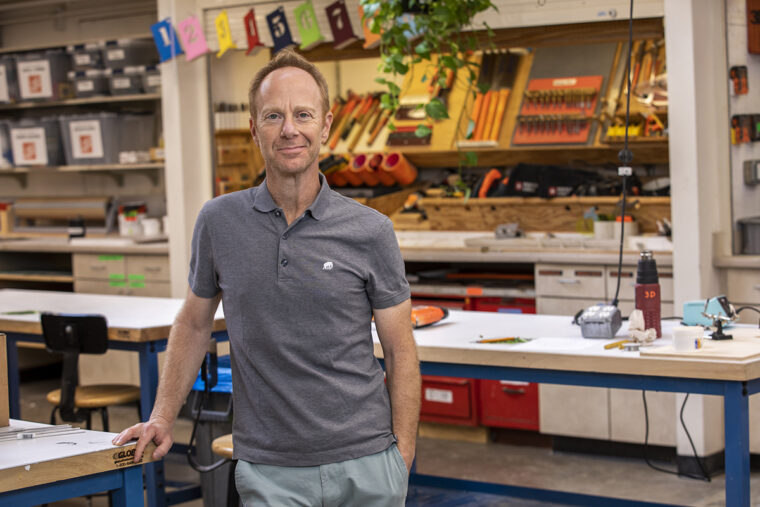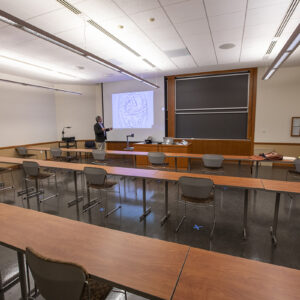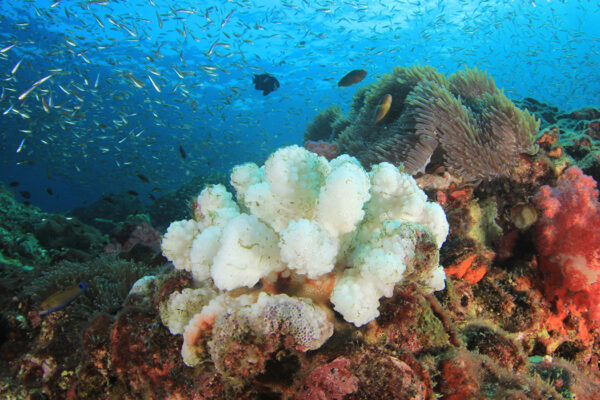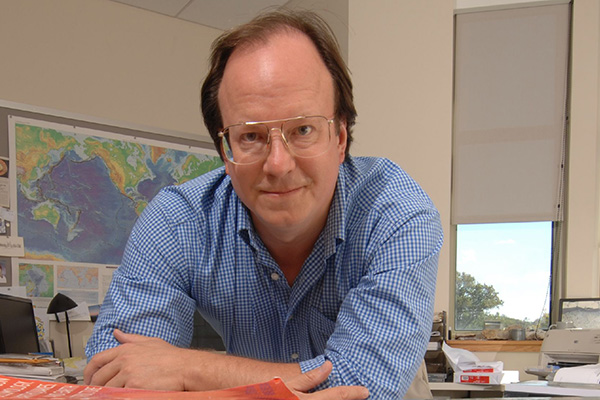Every semester, Arny Nadler, associate professor of art at the Sam Fox School of Design & Visual Arts at Washington University in St. Louis, challenges students in his introductory 3D design class to create an “Arnymover.” They can build anything — a ski slope, a spinning chair, a rolling pepperoni pizza — as long as the contraption causes no bodily harm.
“I tell them, ‘If I get hurt, I will fail you,’” Nadler said with a laugh. “I have had students come back years later and tell me how much they learned making the Arnymover.”
Nadler hopes to reimagine the assignment for the COVID-19 era, but ultimately he cares less about the tradition than the lessons it imparts. Arnymover or no, his students still will learn how to manipulate forms, handle a hacksaw and collaborate with classmates, just as hundreds of Sam Fox students before them did.
“There are still a lot of unknowns, but I do know this class won’t be ‘3D light,’” said Nadler, whose students will meet over Zoom and in studio. “The where and the how will change, the learning will not.”
Nadler was among the 200 faculty members who enrolled this summer in “Designing an Adaptable Course,” an intensive two-week seminar offered by the Center for Teaching and Learning. Broken into cohorts of 10, instructors imagined their courses anew, studying best online pedagogy practices (no long recorded lectures), creating better assessments (fewer final exams, more projects) and learning technology tools (Zoom breakout rooms, Canvas discussion boards). Like most WashU classes, this one demanded time and effort — but also inspired collaboration and creative thinking.
“The whole value of a residential university is getting people together,” said Eric Fournier, director of educational development for the center. “But we can sustain relationships between students and faculty in an online setting.”
‘Hard to learn new moves’
Between “You’re muted” reminders and screen-sharing snafus, Nadler and his fellow faculty members shared their strategies for the fall. One professor described a new software for music students; another expressed hope that the visual nature of his art history class would lend itself to Zoom. Eric Ellingsen, assistant professor of landscape architecture at the Sam Fox School, then described his first-year design studio.
“I’m trying to wrap my head around what to do with that one,” Ellingsen told the group. “It’s very hands on. We walk Grand Boulevard; we build a site where we map and measure and survey together; we work on a site project for a local nonprofit. But nine of the 10 students are international and have visa issues.”
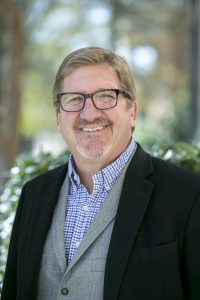
“Oh boy,” responded Fournier, this cohort’s facilitator. “That’s a tough one.”
After brainstorming with Fournier, Ellingsen decided to leverage the locations of his far-flung students by pairing them for notated walks.
“Online teaching isn’t ideal or easy, but it is almost always possible,” said Fournier, a geographer and former Alabama Professor of the Year. “So many of us can walk into a class and play by feel. But it’s harder in this environment. It’s hard to see the reactions; it’s hard to learn new moves.”
The first step, Fournier told the group, is to identify the key learning goals and then build assignments and assessments that lead to those objectives, not vice versa. The practice, known as backward design, has been used by effective instructors long before coronavirus forced instructors to go online.
“What are the concepts and skills your students will know by the end of the class?” Fournier asked the faculty members. “It’s not enough for you to know the answer to that question. Your students need to know the answer, too.”
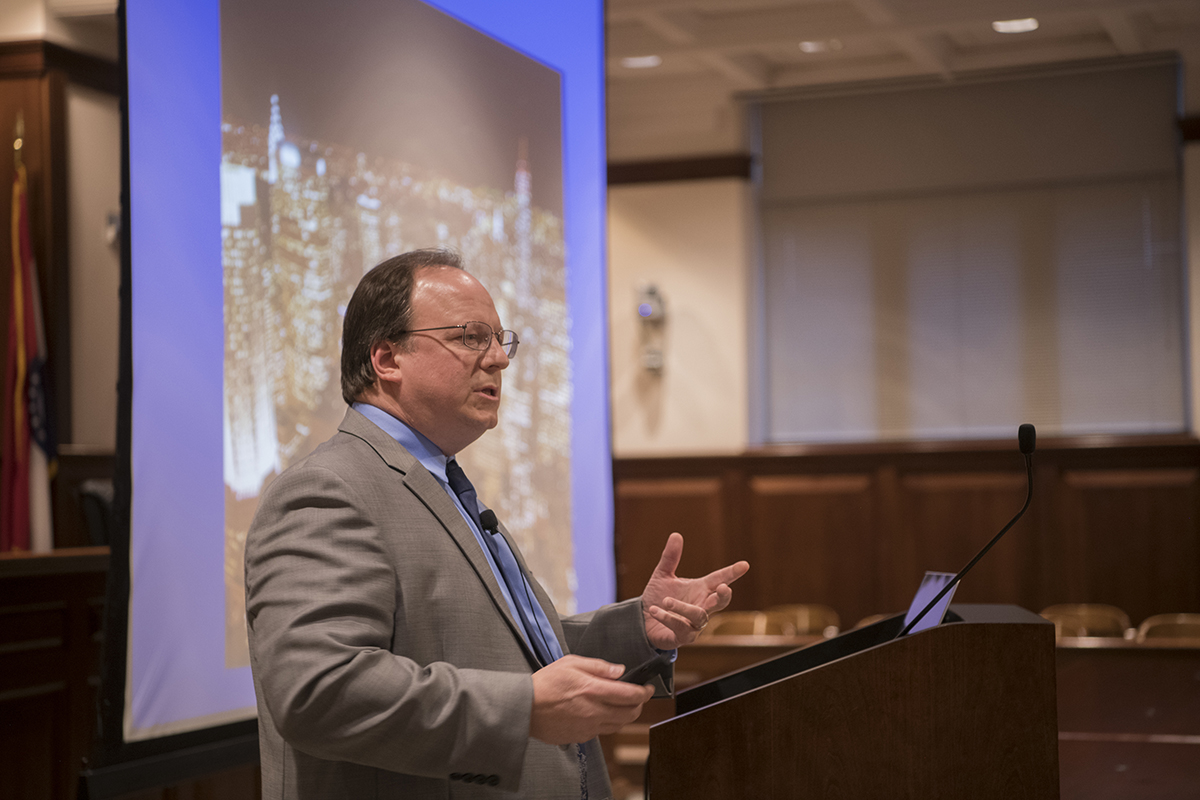
‘And now, here we are’
The seminar is one of many programs offered by the Center for Teaching and Learning. This summer, hundreds of instructors participated in one-on-one consultations and 30-minute workshops covering topics such as “Supporting Students’ Mental Health in an Online Class,” “Reconceptualizing Labs in Online Instruction” and “Creating Inclusive Community Online.”
“There is this outdated concept of the college teaching center as the place where you send bad teachers,” said Michael Wysession, executive director of the teaching center and professor of earth and planetary sciences in Arts & Sciences. “That’s not true. The faculty who are choosing to join these programs take their teaching seriously. The good news is: Small changes in teaching style can have quantifiable improvements in student understanding.”
Take final exams. Replacing a high-stakes final with a variety of frequent, lower-stakes assignments such as quizzes, projects and open-book tests provides students the opportunity to strengthen skills and knowledge while helping instructors determine if students are progressing toward learning goals.
“If we leave this with the final exam being a much de-emphasized part of the educational experience, we will have come out of this in a much better place,” Wysession said.
Wysession is uniquely prepared for the moment. He’s not just good at teaching; he’s good at online teaching. Wysession hosts several online courses such as “The Science of Energy” and “Geological Wonders” for The Great Courses Plus, the popular video-on-demand service. Wysession also was one of four Washington University professors who contributed courses for Semester Online, the university’s ill-fated foray into online courses in 2013. Neither faculty nor students supported the initiative, and the consortium disbanded after a year.
“And now, here we are,” Wysession said. “There is a certain irony that after how poorly the consortium went over here at WashU, we are all now teaching online.”
It has been a journey, Wysession said. Back in March, only 60% of faculty used Canvas, the university’s new learning-management system, and almost no one understood Zoom. The center offered introductory classes and transformed classrooms into makeshift studios where faculty could record lectures. Over time, the center has focused less on online technology and more on online pedagogy.
The hard work will pay off this fall, but it comes at a cost. Summer is when faculty members apply for grants, write articles and complete research — i.e., the work that earns them tenure.
“In many cases, less of that traditional scholarship and research is happening,” Fournier said. “But these faculty members have collectively shattered the myth that faculty at a research university don’t care about teaching.”
Nadler, for instance, is working double time as he prepares for a solo sculpture exhibit in October at the Bruno David Gallery while he plans new outdoor assignments that students can complete with take-home tool kits.
“I still have to get ready for the show. That doesn’t go away,” Nadler said. “But I have been teaching this class on and off for 20 years. It’s one of my favorites. The last thing I want to do is just throw everything on Zoom.”
‘Class of COVID’
On the final day of the seminar, the cohort discusses welcome messages. The best ones, Fournier said, will outline expectations, acknowledge the difficulties students and faculty will face together and explain honestly why the instructor chose to teach a hybrid or online course. Soon the tutorial gives way, once again, to a conversation about student well-being.
“I wonder if the thing they will miss is being seen, if they feel they are just going to be a black spot on a screen,” one instructor said.
“That is one of the things we learned, how you have to be in constant communication so they don’t have an opportunity to disappear,” answered another.
“I feel like it’s my responsibility to embrace what is happening, but I have a hard time looking you all in the eye and saying, ‘Yes. I can’t wait,’” another admitted.
But, perhaps, there is an upside, Nadler said.
“I told my students in the spring and I’ll tell them now, ‘Whether you are an artist, a designer or a writer, moments like this call upon us to reflect on the world — not necessarily to define it or make sense of it, but to process it and present it to the world,” Nadler told the grid of faces. “These students will forever belong to this moment. They won’t be the graduating class of 2021. They are going to be the graduating class of COVID.”
WashU Response to COVID-19
Visit coronavirus.wustl.edu for the latest information about WashU updates and policies. See all stories related to COVID-19.
